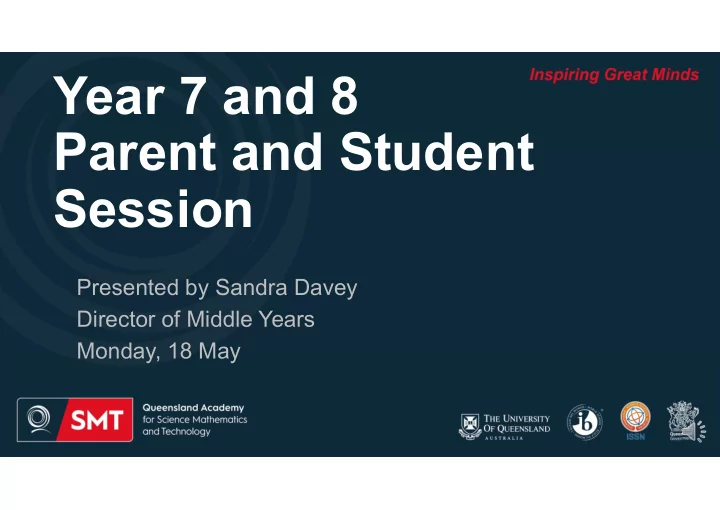

Year 7 and 8 Parent and Student Session Presented by Sandra Davey Director of Middle Years Monday, 18 May
Assembly overview Supporting student learning: • study support strategies • time management • PLPs (personal Learning Plans) • academic integrity Celebration of student achievements
Study strategies for effective learning
1. Group study • Explain, test, teach, share notes, discuss problems and brainstorm possible questions .
2. Mix it up • Mix up types of problems, switch between subjects and keep things varied.
3. Space your study • 5 – 10 minutes break per hour • Study in the day
4. Use prompts • Sticky notes, posters, mind maps, flashcards, acronyms, mnemonics, chunking
5. Practice cognitive rehearsal • Visualisation • Positivity
6. Remove distractions • Multi-tasking is not an effective strategy
7. Take handwritten notes • Write down notes, use colour, highlighters, draw pictures, mind maps, draw links to show relationships.
8. Quiz or test yourself • Use past papers, online quizzes or make your own.
9. Stay healthy • Be active and eat well relax, drink water, get lots of sleep
10. Exam review • AFTER an exam, review how you went. • What study techniques worked well?
Extra tips Be Prepared • Make sure you have all the necessary materials the night before, wear a watch so you can time your answers, know where your exam is, types and styles of questions, length of exam.
Your Turn Pause the video and discuss the following questions before progressing. • What strategies do you use to study? • How effective are they? • Of the strategies presented so far, which one would you like to try out in the future?
Time management
USE your diary! USE your diary! USE your diary!
Term/Monthly overview Term/Month Schedule: • Due dates • Exams • Holidays • Meetings • Practices You can then see what is coming up and what you need to plan for!
Weekly overview Day is broken up into blocks of time. Schedule: • Study • Sport • Chores • Practice • ………..
Daily timetable Note: • It is broken into 30 minute slots, so that you can achieve realistic goals. • Be realistic about your life! • Allow time to relax when you get home from school and include regular breaks in your homework schedule. • Make sure you fill in your sports, hobbies, chores and other family commitments
Daily to-do list
Your Turn Pause the video and discuss the following questions before progressing. • How good are you at managing your time and meeting your commitments? • What are the most effective time management strategies you use? • Are their any new strategies you’d like to try?
PLP: Personal Learning Plans
PLP Personal Learning Plans
PLP Personal Learning plans
Academic Integrity
Learner profile Which IBL attributes are being developed through observing academic integrity ? • Principled • Caring • Reflective
Academic misconduct • Plagiarism - the representation of the ideas or work of another person as your own. • Collusion - supporting misconduct by another candidate, as in allowing your work to be copied or submitted for assessment by another candidate. • Duplication of work - the presentation of the same work for different assessment components and/or IB diploma requirements. • Misconduct during an examination , including the possession of unauthorized material. • Disclosing information to another candidate, or receiving information from another candidate, about the content of an examination paper within 24 hours after the examination.
Actions to be taken in the event academic misconduct is suspected • Teacher, invigilator, or fellow student reports suspected academic misconduct to the Director of Middle Years (MYP Coordinator). • Incident is investigated to determine as to whether academic misconduct has occurred and the extent • If academic misconduct has occurred, parents will be notified and the matter will be recorded on One School. • The assessment will be awarded a non-submission. (zero grade)
Announcements
HPE From Sean Conway
PHE
Language and Literature From Toni Waters and Victoria Snell
How to create an award winning picture book? We look forward to sharing their “award winning, published work” at the QA Book Week celebrations! (fingers crossed that this will occur with the demise of the coronavirus!)
Year 7 and 8 Debating From Jeremy Isaac
Should school uniforms be banned?
Should you have any feedback on this session, please email: • Sandra Davey (sdave13@eq.edu.au)
Should you have any feedback on this session, please email: • Sandra Davey (sdave13@eq.edu.au)
Recommend
More recommend